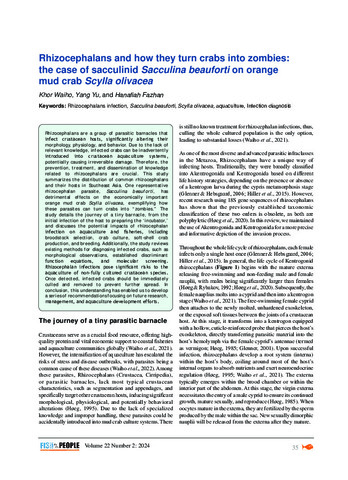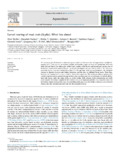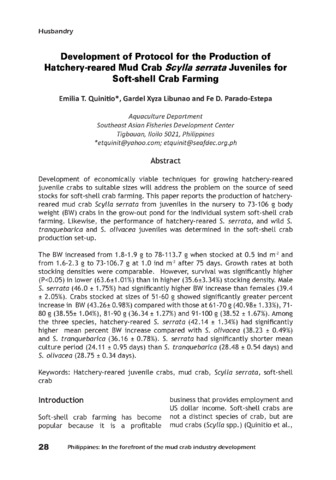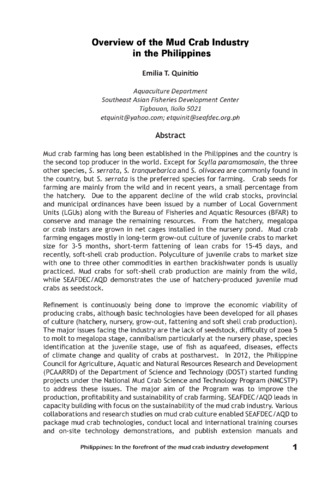Rhizocephalans and how they turn crabs into zombies: the case of sacculinid Sacculina beauforti on orange mud crab Scylla olivacea
Share
Abstract
Rhizocephalans are a group of parasitic barnacles that infect crustacean hosts, significantly altering their morphology, physiology, and behavior. Due to the lack of relevant knowledge, infected crabs can be inadvertently introduced into crustacean aquaculture systems, potentially causing irreversible damage. Therefore, the prevention, treatment, and dissemination of knowledge related to rhizocephalans are crucial. This study summarizes the distribution of common rhizocephalans and their hosts in Southeast Asia. One representative rhizocephalan parasite, Sacculina beauforti, has detrimental effects on the economically important orange mud crab Scylla olivacea, exemplifying how these parasites can turn crabs into “zombies.” The study details the journey of a tiny barnacle, from the initial infection of the host to preparing the ‘incubator,’ and discusses the potential impacts of rhizocephalan infection on aquaculture and fisheries, including broodstock selection, crab culture, soft-shell crab production, and breeding. Additionally, the study reviews existing methods for diagnosing infected crabs, such as morphological observations, established discriminant function equations, and molecular screening. Rhizocephalan infections pose significant risks to the aquaculture of non-fully cultured crustacean species. Once detected, infected crabs should be immediately culled and removed to prevent further spread. In conclusion, this understanding has enabled us to develop a series of recommendations focusing on future research, management, and aquaculture development efforts.
Keywords
Rhizocephalans infection Sacculina beauforti Scylla olivacea aquaculture Infection diagnosisSuggested Citation
Waiho, K., Yu, Y., & Fazhan, H. (2024). Rhizocephalans and how they turn crabs into zombies: the case of sacculinid Sacculina beauforti on orange mud crab Scylla olivacea. Fish for the People , 22(2), 35-43. http://hdl.handle.net/20.500.12066/7519
Subject
Taxonomic term
Koleksi
Related items
Showing items related by title, author, creator and subject.
-
Larval rearing of mud crab (Scylla): What lies ahead
Waiho, Khor; Fazhan, Hanafiah; Quinitio, Emilia T.; Baylon, Juliana C.; Fujaya, Yushinta; Azmie, Ghazali; Wu, Qingyang; Shi, Xi; Ikhwanuddin, Mhd; Ma, Hongyu (Elsevier, 2018)The increasing global demand for mud crabs (genus Scylla) and threats to the wild populations highlight the urgency of fully rearing them in captivity. Despite considerable progress in mud crab production, most crab farms ... -
Development of protocol for the production of hatchery-reared mud crab Scylla serrata juveniles for soft-shell crab farming
Quinitio, Emilia T.; Libunao, Gardel Xyza; Parado-Estepa, Fe D. (Aquaculture Department, Southeast Asian Fisheries Development Center, 2017)Development of economically viable techniques for growing hatchery-reared juvenile crabs to suitable sizes will address the problem on the source of seed stocks for soft-shell crab farming. This paper reports the production ... -
Overview of the mud crab industry in the Philippines
Quinitio, Emilia T. (Aquaculture Department, Southeast Asian Fisheries Development Center, 2017)Mud crab farming has long been established in the Philippines and the country is the second top producer in the world. Except for Scylla paramamosain, the three other species, S. serrata, S. tranquebarica and S. olivacea ...







